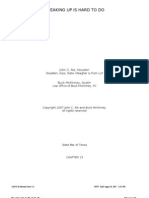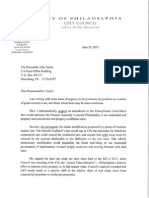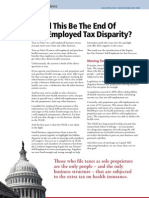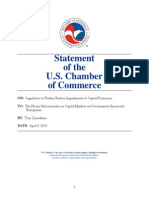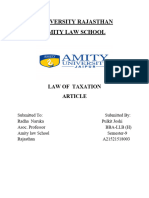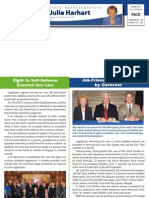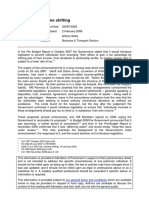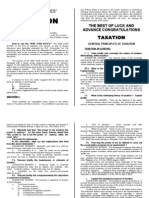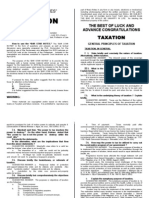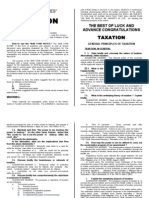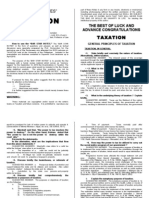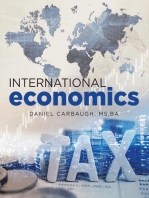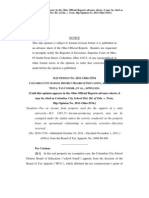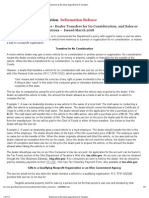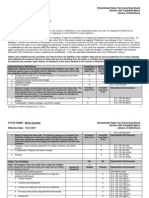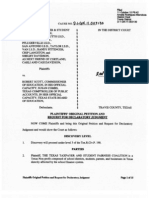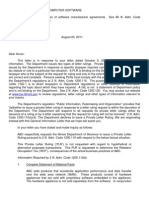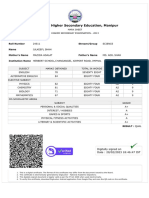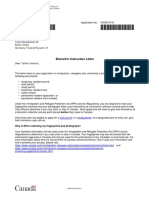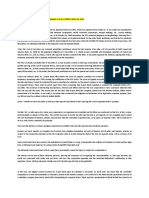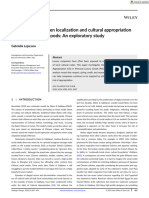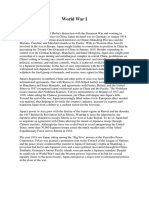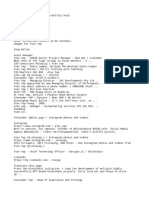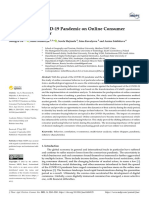TTARA Letter To Texas Supreme Court (Oct. 3, 2011)
TTARA Letter To Texas Supreme Court (Oct. 3, 2011)
Uploaded by
Paul MastersCopyright:
Available Formats
TTARA Letter To Texas Supreme Court (Oct. 3, 2011)
TTARA Letter To Texas Supreme Court (Oct. 3, 2011)
Uploaded by
Paul MastersOriginal Title
Copyright
Available Formats
Share this document
Did you find this document useful?
Is this content inappropriate?
Copyright:
Available Formats
TTARA Letter To Texas Supreme Court (Oct. 3, 2011)
TTARA Letter To Texas Supreme Court (Oct. 3, 2011)
Uploaded by
Paul MastersCopyright:
Available Formats
TTARA
October 3, 2011
FILED IN THE SUPREME COURT OF TEXAS 11 October 3 P4:01 BLAKE. A. HAWTHORNE CLERK
Texas Taxpayers and Research Association
400 West 15 1h Street, Suite 400, Austin, Texas 78701 Telephone: 512/472-8838 * FAX: 512/472-2636 * E-Mail: ttara@ttara.org*Website: www.ttara.org
Supreme Court of Texas PO Box 12248 Austin, Texas 78711 Re: Cause No. 11-0589; In re Allcat Services, L.P. and John Weakley We have an interest in this proceeding before the court, and wish to offer our thoughts on the merits of the Bullock amendment claim in this case. In doing so, we do not comment on any other aspect of the petition nor do we address any other policy considerations relating to the revised franchise tax or how it is calculated. The Texas Taxpayers and Research Association (TIARA) is the state's pre-eminent taxpayer organization. Our membership includes companies in all major sectors of the state's economy, organized under essentially all of the various business forms allowed in this state. TIARA has been actively involved in the development of business tax policy in this state for the past forty years. We participated in the legislative discussions that led up to the Bullock amendment, assisted in its drafting, and took part in the deliberations concerning the 2006 initiative that resulted in the current franchise tax. Consequently, we believe it is appropriate for us to comment on this important issue and provide the court with the rationale behind the conclusions we have come to and testified on previously before the legislature. Article VII, 24(a) of the Texas Constitution, commonly referred to as the "Bullock amendment" states: (a) A general law enacted by the legislature that imposes a tax on the net incomes of natural persons, including a person's share ofpartnership and unincorporated association income, must provide that the portion of the law imposing the tax not take effect until approved by a majority of the registered voters voting in a statewide referendum held on the question of imposing the tax. The referendum must specify the rate of the tax that will apply to taxable income as defmed by law. [emphasis added] TIlls provision does not prohibit the legislature from imposing a tax on partnerships. Several observations lead us to this conclusion:
1. The language in the Bullock amendment requires public approval of an income tax on natural persons. The phrase at issue, "including a person's share ofpartnership and unincorporated association income, modifies "net incomes of natural oersons" and is
JJ
Chairman
Gary L. Hoekstra
The Dow Chemical Company
President Dale K. Craymer
Immediate Past Chairman Del R. Threadgill JC Penney Company
Supreme Court of Texas Page 2 October 3, 2011
simply clarifying language recognizing that the income of a natural person can include more than just wages and salaries. It does not require public approval of the direct taxation of a business that may be a source of income to a natural person. 2. The franchise tax is a tax on a business, including those operating as partnerships. It is the responsibility of the partnership to calculate the franchise tax, file the return, and pay the tax, not the individual partners-unlike the treatment of partnership income under federal tax law. The franchise tax is simply a cost of the partnership-like sales and property taxesthat must be paid before the net income of the partnership and its distribution to partners is even determined. It should also be noted that the franchise tax is a "privilege" tax imposed on business for the privilege of doing business in Texas in a form that provides protections from liability (Black's Law Dictionary actually provides separate definitions of the term "franchise tax" and "income tax"). Part of the rationale for the tax changes made in 2006 was to better align the tax with the benefits received under various forms of organization. Entities that receive the benefits of liability protection are subject to the tax; those that do not receive liability protections are not. For this reason the tax was extended to limited pminerships, limited liability partnerships, and professional associations, but not to general partnerships solely owned by natural persons or sole proprietorships. In this sense, the franchise tax is more like a fee assessed for the privilege of doing business. In fact, the U.S. Bureau of the Census classifies the Texas franchise tax as a fee on the business entity-not as an income tax. 3. State law specifically states that a partnership and its partners are distinct from one another. Sec. 152.056, Business Organizations Code, reads: "A partnership is an entity distinct from its partners." In fact, the very reason for forming a limited partnership is to create separation between the business and its owners. Therefore, levying a tax on a partnership does not equate to levying a tax on its partners. 4. The ballot language of the Bullock amendment made no reference to prohibiting a tax on business entities. Voters were simply asked to vote for or against the proposition:
The constitutional amendment prohibiting a personal income tax without voter approval and, ifan income tax is enacted, dedicating the revenue to education and limiting the rate oflocal school taxes.
This language clearly shows that the Legislature intended and voters approved a restriction concerning the imposition of a personal income tax, not a business tax. If the purpose of the phrase referencing income from partnerships was intended by the Legislature to prevent a tax on business entities, that surely would have been specifically mentioned in the ballot language. A voter's plain reading of the ballot language would never have led to the conclusion that a vote for the amendment was to impose a referendum requirement on the taxation of a business entity.
Chairman Gary L. Hoekstra The Dow Chemical Company
President Dale K. Craymer
Immediate Past Chairman Del R. Threadgill IC Penney Company
Supreme Court of Texas Page 3 October 3, 2011
5. The Legislature understood that the Bullock amendment did not prohibit the direct taxation of partnerships. a. Since some "partnerships" were subject to the franchise tax prior to the "Bullock amendment," had it been the legislature's intent not to tax partnerships they would have said so. In 1991, Texas authorized the "limited liability company" (LLC) as an entity able to organize under Texas law and added it to the list of businesses required to pay the franchise tax (House Bill 278, nnd Legislature, Regular Session). At that time and still today, an LLC with more than one member may elect to be treated as a partnership for federal tax purposes and file IRS Form 1065, U.S. Return of Partnership Income. If the Bullock amendment was intended to prohibit taxation of partnerships under the franchise tax, the existing tax on limited liability companies would have been called into question. It was not. b. House floor debate on the Bullock amendment shows that legislators understood that it was not meant to apply to a tax on a business entity. A series of questions often is asked during floor debate for the purpose of clarifying what a given measure is intended or not intended to do. The oral record of House floor debate on the Bullock amendment included the following exchange (as referenced by April 17, 2006 letter of the First Assistant Attorney General, Barry R. McBee, to the Governor's Chief of Staff, Deirdre Delisi): Q: Mr. Williamson: This amendment is addressed as a personal income tax. Is that correct? A: Mr. Stiles (House sponsor): That's correct. Q: Mr. Williamson: Now, is there a prohibition, or will there be a prohibition on a business income tax? A: Mr. Stiles: Be okay with me. Q: Mr. Williamson: No--but I mean-is that part of the amendment? A: Mr. Stiles: That's not there, no. We appreciate the opportunity to comment on the proceedings and are happy to offer any additional information the court may require. Sincerely,
Dale K. Craymer President
Chainnan Gary L. Hoekstra The Dow Chemical Company
President Dale K. Craymer
Immediate Past Chainnan Del R. Threadgill IC Penney Company
You might also like
- ABAKADA GURO Partylist v. Executive Secretary (G.R. No. 168056)Document3 pagesABAKADA GURO Partylist v. Executive Secretary (G.R. No. 168056)Roward100% (6)
- Breaking Up Is Hard To Do (Buck McKinney)Document31 pagesBreaking Up Is Hard To Do (Buck McKinney)Christopher S. HarrisonNo ratings yet
- The Business TrustDocument17 pagesThe Business TrustdbircS4264100% (7)
- Sylvester J. Orsi - The Limited Liability Company - An Organizational Alternative For Small BusinessDocument34 pagesSylvester J. Orsi - The Limited Liability Company - An Organizational Alternative For Small BusinessBonya SusatyoNo ratings yet
- Dr. Eduardo M. Rivera: Re: Removal of Federal or State Tax LienDocument31 pagesDr. Eduardo M. Rivera: Re: Removal of Federal or State Tax Lienjohnmv920No ratings yet
- Dr. Eduardo M. Rivera: This Is A Riveranewsletter Which Is Sent As Part of Your Ongoing Education ServiceDocument31 pagesDr. Eduardo M. Rivera: This Is A Riveranewsletter Which Is Sent As Part of Your Ongoing Education ServiceNick FurlanoNo ratings yet
- The New Income Tax Scandal: How the Income Tax Cheats Workers out of Million$ Each Year and the Corrupt Reasons Why This HappensFrom EverandThe New Income Tax Scandal: How the Income Tax Cheats Workers out of Million$ Each Year and the Corrupt Reasons Why This HappensNo ratings yet
- Domondon Tax NOTESDocument81 pagesDomondon Tax NOTESAntonio B ManaoisNo ratings yet
- Conflict ResolutionDocument7 pagesConflict Resolutionpedrooliveira2603No ratings yet
- Managed Funds Association Letter To Congress Regarding Carried InterestDocument3 pagesManaged Funds Association Letter To Congress Regarding Carried InterestDealBookNo ratings yet
- 2015 Progress Texas Constitutional Amendment Ballot GuideDocument4 pages2015 Progress Texas Constitutional Amendment Ballot GuideProgressTX100% (1)
- Tax Reform AnalysisDocument12 pagesTax Reform AnalysisPhiladelphiaMagazineNo ratings yet
- Abakada Guro Party List Vs Executive SecretaryDocument8 pagesAbakada Guro Party List Vs Executive SecretaryshelNo ratings yet
- An Honest Day's Work: Regulating Outside Income of Legislative Officers - CAPI Issue Brief - September 2016Document4 pagesAn Honest Day's Work: Regulating Outside Income of Legislative Officers - CAPI Issue Brief - September 2016Center for the Advancement of Public IntegrityNo ratings yet
- CON: A Bill To Reform Federal Corporate TaxationDocument7 pagesCON: A Bill To Reform Federal Corporate TaxationsashashilkoNo ratings yet
- The Stop Tax Haven Abuse Act SummaryDocument11 pagesThe Stop Tax Haven Abuse Act SummaryCitizens for Tax Justice100% (1)
- Re: HB Public School Employees - Collective Bargaining - Representation FeesDocument7 pagesRe: HB Public School Employees - Collective Bargaining - Representation FeesdaggerpressNo ratings yet
- US Internal Revenue Service: Ir-04-081Document17 pagesUS Internal Revenue Service: Ir-04-081IRSNo ratings yet
- Uniform Statutory Trust ActDocument109 pagesUniform Statutory Trust ActRJNo ratings yet
- Fisher v. Trinidad G.R. No. L-17518 October 30, 1922Document10 pagesFisher v. Trinidad G.R. No. L-17518 October 30, 1922aNo ratings yet
- Tax Notes Domondon 2010Document81 pagesTax Notes Domondon 2010Ardy Falejo FajutagNo ratings yet
- H.I. Hettinger & Co. v. Municipality of St. Thomas and St. John H.I. Hettinger & Co. v. Municipality of St. Croix, 187 F.2d 774, 3rd Cir. (1951)Document5 pagesH.I. Hettinger & Co. v. Municipality of St. Thomas and St. John H.I. Hettinger & Co. v. Municipality of St. Croix, 187 F.2d 774, 3rd Cir. (1951)Scribd Government DocsNo ratings yet
- Tax 2 DigestsDocument14 pagesTax 2 DigestsJJ PernitezNo ratings yet
- Prevailing Wage Legislation - Does It MatterDocument3 pagesPrevailing Wage Legislation - Does It MatterHoughton County Democratic PartyNo ratings yet
- Henry B. Hansmann : HERE Has Recently Been Considerable Agitation From The BusinessDocument32 pagesHenry B. Hansmann : HERE Has Recently Been Considerable Agitation From The Businesschimezie EmmaNo ratings yet
- SBM JanFeb 08 SE Advocacy Nov 20, 2009Document2 pagesSBM JanFeb 08 SE Advocacy Nov 20, 2009nchc-scribdNo ratings yet
- Domondon Star Notes 2010 Law Bar ReviewDocument80 pagesDomondon Star Notes 2010 Law Bar ReviewJoseph Rinoza Plazo100% (1)
- Statement of The U.S. Chamber of CommerceDocument18 pagesStatement of The U.S. Chamber of Commerceapi-249785899No ratings yet
- Burk-Waggoner Oil Assn. v. Hopkins, 269 U.S. 110 (1925)Document4 pagesBurk-Waggoner Oil Assn. v. Hopkins, 269 U.S. 110 (1925)Scribd Government DocsNo ratings yet
- Texas Senate Subcommitte Report - LendingDocument53 pagesTexas Senate Subcommitte Report - LendingCalvin Glenn M.No ratings yet
- articles of incorporation ncDocument3 pagesarticles of incorporation nchoopsmarvinwilfriedNo ratings yet
- Fisher Vs TrinidadDocument11 pagesFisher Vs TrinidadJeff GomezNo ratings yet
- House Hearing, 109TH Congress - Markup of H.R. 1316 The 527 Fairness Act of 2005Document42 pagesHouse Hearing, 109TH Congress - Markup of H.R. 1316 The 527 Fairness Act of 2005Scribd Government DocsNo ratings yet
- Report On Tax Exempt Wages and SalariesDocument12 pagesReport On Tax Exempt Wages and SalariesBillie Russell Schofield100% (1)
- Law of TaxationDocument9 pagesLaw of TaxationKirti GoyalNo ratings yet
- ABAKADA Guro Party List Vs Executive SecretaryDocument3 pagesABAKADA Guro Party List Vs Executive SecretaryJulian Duba0% (1)
- Income Tax VoluntaryDocument19 pagesIncome Tax VoluntaryMountain Goat II100% (3)
- Connecticut Entity Transactions ActDocument2 pagesConnecticut Entity Transactions ActewhittemNo ratings yet
- HeinonlineDocument21 pagesHeinonlineKanita Imamovic-CizmicNo ratings yet
- Tolentino vs. Secretary of Finance (1995)Document25 pagesTolentino vs. Secretary of Finance (1995)Phulagyn CañedoNo ratings yet
- LSB11185Document4 pagesLSB11185Dorjee SengeNo ratings yet
- Fall 2011: Right To Self-Defense Enacted Into LawDocument4 pagesFall 2011: Right To Self-Defense Enacted Into LawPAHouseGOPNo ratings yet
- Income Shifting: Our General Terms and ConditionsDocument21 pagesIncome Shifting: Our General Terms and ConditionsJesavil SinghbalNo ratings yet
- STAY AWAY FROM NEVADA HOAsDocument2 pagesSTAY AWAY FROM NEVADA HOAsnevadahoafraudNo ratings yet
- 01 Liggett v. Lee (Acido)Document2 pages01 Liggett v. Lee (Acido)Cindee YuNo ratings yet
- JCOPE Complaint 11-18-13 FINAl PDFDocument5 pagesJCOPE Complaint 11-18-13 FINAl PDFRick KarlinNo ratings yet
- Legislative Session ReviewDocument4 pagesLegislative Session ReviewCarisa AzariaNo ratings yet
- Domondon Taxation Notes 2010Document79 pagesDomondon Taxation Notes 2010jdispositivumNo ratings yet
- Domondon Taxation Notes 2010Document79 pagesDomondon Taxation Notes 2010Jhanelyn V. InopiaNo ratings yet
- Domondon ReviewerDocument79 pagesDomondon ReviewerGreg PallugnaNo ratings yet
- BA-Final Notes Class 1: Introduction To The Corporation and Incorporating Under Australian LawDocument5 pagesBA-Final Notes Class 1: Introduction To The Corporation and Incorporating Under Australian LawDivyaNo ratings yet
- Domondon Taxation Notes 2010Document79 pagesDomondon Taxation Notes 2010Charles de Vera100% (6)
- Working With LLCs and FLPs: A Practitioner's Guide to Limited Liability Companies and Family Limited PartnershipsFrom EverandWorking With LLCs and FLPs: A Practitioner's Guide to Limited Liability Companies and Family Limited PartnershipsNo ratings yet
- The Benefit and The Burden: Tax Reform-Why We Need It and What It Will TakeFrom EverandThe Benefit and The Burden: Tax Reform-Why We Need It and What It Will TakeRating: 3.5 out of 5 stars3.5/5 (2)
- Textbook of Urgent Care Management: Chapter 6, Business Formation and Entity StructuringFrom EverandTextbook of Urgent Care Management: Chapter 6, Business Formation and Entity StructuringNo ratings yet
- How to Structure Your Business for Success: Choosing the Correct Legal Structure for Your BusinessFrom EverandHow to Structure Your Business for Success: Choosing the Correct Legal Structure for Your BusinessNo ratings yet
- Nolo's Quick LLC: All You Need to Know About Limited Liability CompaniesFrom EverandNolo's Quick LLC: All You Need to Know About Limited Liability CompaniesRating: 4.5 out of 5 stars4.5/5 (7)
- Colo. DOR, FYI Pub. Sales 62: Guidelines For Determining When To Collect State-Collected Local Sales Tax (Oct. 2011)Document3 pagesColo. DOR, FYI Pub. Sales 62: Guidelines For Determining When To Collect State-Collected Local Sales Tax (Oct. 2011)Paul MastersNo ratings yet
- Indiana DOR, Letter of Findings Number 04-2010069 (Nov. 4, 2011)Document2 pagesIndiana DOR, Letter of Findings Number 04-2010069 (Nov. 4, 2011)Paul MastersNo ratings yet
- Columbus City School Dist. Bd. of Edn. v. Testa, Slip Opinion No. 2011-Ohio-5534Document13 pagesColumbus City School Dist. Bd. of Edn. v. Testa, Slip Opinion No. 2011-Ohio-5534Paul MastersNo ratings yet
- Arizona DOR Decision, Case 201000178-S (Aug. 1, 2011)Document10 pagesArizona DOR Decision, Case 201000178-S (Aug. 1, 2011)Paul MastersNo ratings yet
- Ohio Tax Information Release ST 2007-04 (Revised Oct. 1, 2011)Document3 pagesOhio Tax Information Release ST 2007-04 (Revised Oct. 1, 2011)Paul MastersNo ratings yet
- Indiana DOR Letter of Findings: 04-20100641 09-20100639 10-20100640 (Oct. 26, 2011)Document10 pagesIndiana DOR Letter of Findings: 04-20100641 09-20100639 10-20100640 (Oct. 26, 2011)Paul MastersNo ratings yet
- In The United States Bankruptcy Court For The District of DelawareDocument28 pagesIn The United States Bankruptcy Court For The District of DelawarePaul MastersNo ratings yet
- North Carolina Taxability Matrix 2011 Revised 10-21-2011Document17 pagesNorth Carolina Taxability Matrix 2011 Revised 10-21-2011Paul MastersNo ratings yet
- Texas Taxpayer Student Fairness Coalition FilingDocument17 pagesTexas Taxpayer Student Fairness Coalition FilingPaul MastersNo ratings yet
- Illinois General Information Letter On Software Maintenance, ST 11-0070-GIL (Aug. 29, 2011)Document4 pagesIllinois General Information Letter On Software Maintenance, ST 11-0070-GIL (Aug. 29, 2011)Paul MastersNo ratings yet
- DOC-20240924-WA0002.Document8 pagesDOC-20240924-WA0002.ishimwesameernNo ratings yet
- New BeetleDocument3 pagesNew BeetleJennifer MininnoNo ratings yet
- Sales and Distribution Channel of ITC Cigarettes 1Document17 pagesSales and Distribution Channel of ITC Cigarettes 1Shamim RizviNo ratings yet
- Midwifery Education Preface & Standards EngDocument11 pagesMidwifery Education Preface & Standards EngMumtihana MuchlisNo ratings yet
- Thai Food & Culture: What Is The Food Like?Document2 pagesThai Food & Culture: What Is The Food Like?Khuyen NguyenNo ratings yet
- Council of Higher Secondary Education, ManipurDocument1 pageCouncil of Higher Secondary Education, Manipurfascondahens_5777232No ratings yet
- Imm5756 1-Nd0l6e9Document3 pagesImm5756 1-Nd0l6e9Таміла УсяєваNo ratings yet
- Assistant Lecturer: Ahmed Najm Abed University of Kufa, Faculty of Education - Department of EnglishDocument17 pagesAssistant Lecturer: Ahmed Najm Abed University of Kufa, Faculty of Education - Department of EnglishMohammed AlkhafajiNo ratings yet
- A Guide To Rational LivingDocument23 pagesA Guide To Rational LivingJerome BrusasNo ratings yet
- Final Accounts - AdjustmentsDocument12 pagesFinal Accounts - AdjustmentsSarthak Gupta100% (2)
- Business Plan LivestockDocument8 pagesBusiness Plan LivestockArthur Pentax0% (1)
- Session 3 - JournalDocument27 pagesSession 3 - JournalanandakumarNo ratings yet
- Kalender Lari Indonesia Sept - Desember 2024Document19 pagesKalender Lari Indonesia Sept - Desember 2024arrahmanzaNo ratings yet
- Gratuity Work ConditionsDocument7 pagesGratuity Work ConditionshelloNo ratings yet
- An Introduction To Marxist Economic Theory - Ernest Mandel PDFDocument84 pagesAn Introduction To Marxist Economic Theory - Ernest Mandel PDFmi101No ratings yet
- BP A2P Tests Unit7Document4 pagesBP A2P Tests Unit7huynhthitt23No ratings yet
- 35-First Lepanto Taisho Insurance Corp. v. CIR G.R. No. 197117 April 10, 2013Document4 pages35-First Lepanto Taisho Insurance Corp. v. CIR G.R. No. 197117 April 10, 2013Jopan SJNo ratings yet
- Pacific Rehouse Corporation v. Court of Appeals, G.R. No. 199687, March 24, 2014Document11 pagesPacific Rehouse Corporation v. Court of Appeals, G.R. No. 199687, March 24, 2014EdvangelineManaloRodriguezNo ratings yet
- 3-Days National Workshop-Cum-Training Programme On NewgenlibDocument33 pages3-Days National Workshop-Cum-Training Programme On NewgenlibMayank SinghNo ratings yet
- identity-and-access-management-designer_5 (1)Document11 pagesidentity-and-access-management-designer_5 (1)vivsu91No ratings yet
- Strategic Change - 2022 - Lojacono - The Fine Line Between Localization and Cultural Appropriation in Personal Luxury GoodsDocument10 pagesStrategic Change - 2022 - Lojacono - The Fine Line Between Localization and Cultural Appropriation in Personal Luxury GoodsWiboon KittilaksanawongNo ratings yet
- World War I - JapanDocument1 pageWorld War I - JapanSusi MeierNo ratings yet
- Rubric For Role PlayingDocument2 pagesRubric For Role PlayingLorie Mae Domingo100% (1)
- Guidance For Outward International Swift Payment Off201117nwiDocument4 pagesGuidance For Outward International Swift Payment Off201117nwijamalazoz05No ratings yet
- Alex YapDocument3 pagesAlex YapABDUL HALIM BIN BASRI MoeNo ratings yet
- When Are Military Holidays in United States - Google SearchDocument1 pageWhen Are Military Holidays in United States - Google SearchNicholson SmithNo ratings yet
- Module 02 RRES BuddhismDocument9 pagesModule 02 RRES Buddhismalleahvillajuan434No ratings yet
- Impact of The COVID-19 Pandemic On Online Consumer Purchasing BehaviorDocument19 pagesImpact of The COVID-19 Pandemic On Online Consumer Purchasing BehaviorBình BìnhNo ratings yet
- Aw AlbermarleDocument7 pagesAw Albermarlepachdgdhanguro100% (5)
- Im3059 - CC02 - Group 3Document51 pagesIm3059 - CC02 - Group 3NGÂN PHẠM NGỌC THẢONo ratings yet

